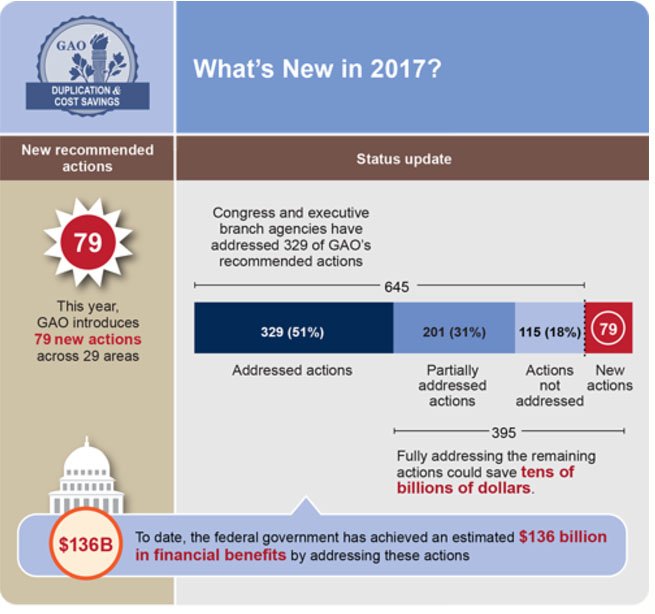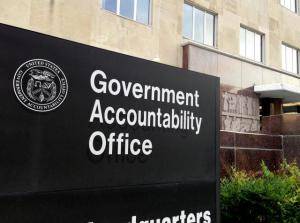
The Government Accountability Office's report on reducing agency fragmentation, overlap, and duplication shows the federal government could save tens of billions of...
Agencies feeling overwhelmed by the government reorganization might find some help in the form of a 150-page audit.
The Government Accountability Office released its annual report on fragmentation, overlap, and duplication at Executive Branch agencies, and Comptroller General Gene Dodaro said his office’s recommendations could come in handy this summer as departments plan their reorganization strategies.
Dodaro told members of the Senate Homeland Security and Governmental Affairs committee April 26, that he met with Office of Management and Budget Director Mick Mulvaney and told him GAO would be sending letters to each of the departments outlining open recommendations, and “giving priority attention to those I think the head of the agency needs to pay personal attention to over the coming months.”
“I think this will be particularly helpful as they go through their exercise of looking at reorganization, streamlining and gaining some more efficiencies in the federal government,” Dodaro added.
Committee Chairman Sen. Ron Johnson (R-Wis.) said the reorganization plan would help “streamline” the federal government.
“There are still hundreds of recommendations that have not been implemented, and far too many areas of duplication remaining in the federal government that should be addressed,” Johnson said in a statement.
GAO in its newest report recommended 79 new actions across 29 new areas.

The programs targeted by GAO’s recommended actions run the gamut. Among some of the recommendations on the list are:
Once again DoD, the Health and Human Services Department and IRS are the agencies with the most number of not addressed or partially addressed actions.
A newly open action at the Defense Department urges DOD to improve its commissary management, which would save the department $2 billion.
HHS needs “timely, complete, and consistent data on Medicaid personal care services so it can effectively monitor these services, which could lead to savings of tens of millions of dollars annually,” GAO reported.
IRS could save hundreds of millions of dollars, GAO said, if it improved administration on the Earned Income Tax Credit, Additional Child Tax Credit and the American Opportunity Tax Credit.
While most of the recommendations are directed toward agencies, GAO did include 61 open recommendations for Congress, including one that says lawmakers should consider amending the Social Security Act to allow the Social Security Administration to share its full death file with the Do Not Pay working system.
“Most of the savings that have occurred to date have occurred from Congress taking action,” Dodaro said.
Another of those congressional actions would be to allow IRS to have correctable error authority, said J. Russell George, inspector general for the Treasury Inspector General for Tax Administration (TIGTA).
“The IRS still does not have the authority to correct tax returns during processing, in which the information provided by the taxpayer does not match the information available to the IRS,” George said. “As a result, the IRS must conduct an audit to address potentially erroneous, refundable claims.”
George said having this authority could allow IRS to make a change on a return for about $1.50, compared to the $300 price tag for an audit.
Dodaro said IRS has been given this authority in very specific cases, but nothing as broad as what George suggested.
“I think this area makes sense,” Dodaro said. “There’s a good case for it. With proper safeguards it should be in place. Nobody wants to disadvantage the taxpayer and the due process that they have.”
Correctable error authority wasn’t the only authority discussed during the hearing.
Sen. Heidi Heitkamp (D- N.D.) asked Dodaro what could be done to maintain efforts like the Office of Personnel Management’s Hiring Excellence campaign, and what federal hiring duplication improvements could be made “that will get us people who actually pay attention to duplication and come to us with great ideas on how we can save taxpayers money.”
Dodaro said one of the recommendation areas in the report is having OPM review federal hiring authorities. A study of OPM data found there were 105 hiring authorities used in fiscal 2014, and 20 of those authorities were used to hire about 90 percent of the people.
“Our suggestion to OPM is why aren’t these other authorities helpful,” Dodaro said. “If not, maybe we should eliminate them, refine them. Which ones are effective, have they effectively communicated that across the departments and agencies? So in a lot of cases there may be a need to give some additional authority, but there’s plenty of authority available and agencies aren’t using it fully and the question is why not. That’s what we’ve recommended OPM do but so far they’ve only looked at and evaluated six of the 105 hiring authorities we suggested they take another examination of.”
Sen. Claire McCaskill (D-Mo.) brought up areas of improvement for the Veterans Affairs Department, specifically if there were any problems with the Jefferson Barracks Division construction project near St. Louis County, Missouri, because she had heard rumors of integrity and construction quality problems.
“Fiscal year 2012 was the only time since fiscal year 2008 that we’ve funded less than 100 percent of the requests that were made by VA,” McCaskill said. “I don’t think there’s anybody else in government that has that kind of track record in terms of securing appropriations, particularly for capital. Even the military doesn’t have that kind of success rate.”
“There’s no such thing as a 100 percent perfect contractor or project,” Repko said. “I would say contractors would say there’s no such thing as a 100 percent perfect customer. I can say in our project, [VA’s Office of Construction and Facilities Management] is working through any issues, but there’s nothing significant either in quality that I’m aware of or any concern that would jeopardize this project.”
Since GAO started the report in fiscal 2010, it’s recommended 645 actions in nearly 250 areas for Congress and agencies.
Eighty-two percent of those actions have been partially or fully addressed, GAO reported, and about 51 percent of those recommended actions have been taken, saving about $136 billion.
“I am worried about the overall fiscal health of the federal government,” Dodaro said. “I issued a special report this past January basically saying the federal government is on a long-term unsustainable fiscal path. I called for an action plan by the Congress to deal with fiscal policy changes that are needed to be made. While there need to be changes made in fiscal policy both on the spending and revenue side, there are some things that can be done.”
Copyright © 2024 Federal News Network. All rights reserved. This website is not intended for users located within the European Economic Area.


